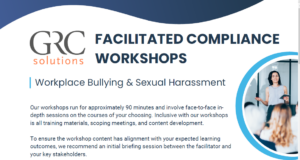Illuminating the Path Forward: Addressing Sexual Harassment Ahead of the 2024 NSW Local Government Elections
As we gear up for the 2024 elections, with our heightened awareness of gender-based violence in the community, it’s essential to assess whether the intervening years have seen meaningful change.
As the 2024 NSW Local Government elections approach, it’s imperative to shine a light on the persistent issue of sexual harassment within local councils. Building upon the revelations of the 2021 exposé in The Sydney Morning Herald, we must ask ourselves: what advances have been made, and what more can be done to foster safer, more inclusive council environments for staff and elected officials?
The 2021 investigation starkly illuminated the prevalence of gendered abuse and harassment within local councils across Australia. As we gear up for the 2024 elections, with our heightened awareness of gender-based violence in the community, it’s essential to assess whether the intervening years have seen meaningful change. While various initiatives and campaigns have aimed to address workplace harassment, the journey towards genuine transformation remains incomplete.
One area deserving of heightened attention is the realm of training and education. Effective training programs, both face-to-face and online, are instrumental in equipping council members and staff with the knowledge and skills necessary to prevent and respond to instances of harassment. However, the quality and accessibility of such training remains a key concern, particularly in regional councils.
Face-to-face training sessions offer invaluable opportunities for interactive learning and dialogue, allowing participants to engage with experts and peers in real-time. These sessions can facilitate nuanced discussions about power dynamics, consent, and respectful behaviour, fostering a culture of mutual respect and accountability within councils.
Simultaneously, quality eLearning modules complement face-to-face training, providing flexible and accessible options for council members and staff to consolidate their knowledge. Interactive online courses offer engaging content, quizzes, and case studies, enabling participants to learn at their own pace and convenience. Moreover, eLearning platforms facilitate accessible ongoing learning and reinforcement, ensuring that the principles of respectful conduct remain at the forefront of council culture with annual refreshers and reminders.
The efficacy of training programs hinges not only on their format but also on their content and delivery.
However, the efficacy of training programs hinges not only on their format but also on their content and delivery. Too often, training initiatives may fall short in addressing the nuanced complexities of sexual harassment, focusing solely on legal compliance or surface-level awareness. To effect meaningful change, training modules must delve deeper, exploring issues of power, privilege, and systemic inequality.
Moreover, training must be tailored to the unique context of local government, acknowledging the specific challenges and dynamics inherent within council environments. Real-world case studies and scenarios drawn from the experiences of local councils enhances relevance and applicability, empowering participants to recognise and address harassment in their own contexts.
it is essential that candidates, incumbents, and voters alike prioritise the issue of sexual harassment within local councils.
As we navigate the road to the 2024 NSW Local Government elections, it’s essential that candidates, incumbents, and voters alike prioritise the issue of sexual harassment within local councils. Political platforms must commit to investing in comprehensive training programs, both face-to-face and online elements in combination, as part of a broader strategy to foster safer and more inclusive council environments.
Furthermore, electoral scrutiny should extend beyond campaign rhetoric, demanding unwavering commitments to training and education from aspiring representatives. Additionally, accountability mechanisms must be established to ensure that councils uphold their obligations to provide safe and respectful workplaces for all.
In the quest for progress, let us not lose sight of the ultimate goal: to cultivate a culture of dignity, respect, and equality within local government. By prioritising quality training and education, we can illuminate the path forward, forging a future where harassment has no place and where all individuals are empowered to thrive.
To read the original Sydney Morning Herald article from 2021 click here (paywall).
For more information on our resources, see below, or, contact:

Gavin Gilbert
gavin.gilbert@grc-solutions.com
GRC Solutions Resources
GRC Solutions have a suite of compliance training resources tailored for the Local Governement sector in Australia – details here
Face-to-Face Workshops
Classes of fewer than 30 learners, to promote interactivity, delivered by training and managment experts. We are ready to come to your sites to help you ensure that problems don’t arise. Download our brochure.
Online Compliance Training
- Workplace Behaviours for Local Government – Australia
- Workplace Behaviours – Australia
- Workplace Behavours – New Zealand
- Workplace Bahaviours for Schools – Australia
Unconscious Bias
We also offer standalone training on unconscious bias to help you and your staff recognise and analyse your unconscious biases, in order to deliver fairer and more reasonable outcomes and to create an inclusive organisational culture.
